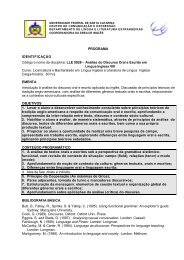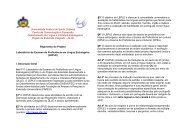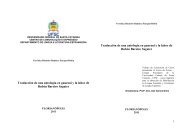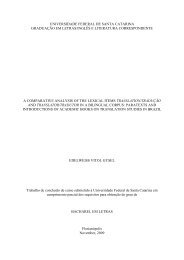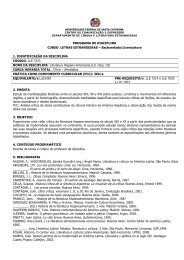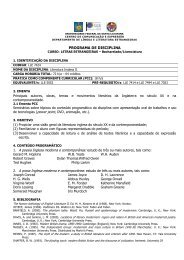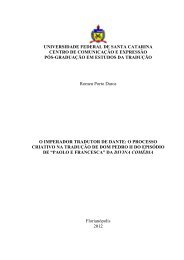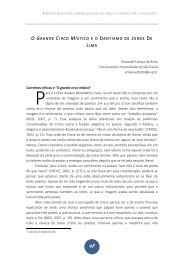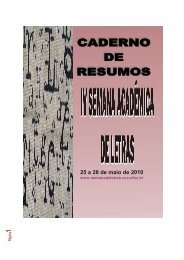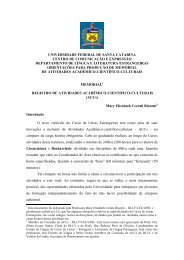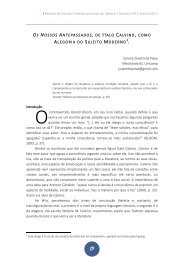Ana Amado é Professora de Análise Filmica e Teoria na ...
Ana Amado é Professora de Análise Filmica e Teoria na ...
Ana Amado é Professora de Análise Filmica e Teoria na ...
- No tags were found...
You also want an ePaper? Increase the reach of your titles
YUMPU automatically turns print PDFs into web optimized ePapers that Google loves.
told. Today, the revolutio<strong>na</strong>ry actions of the parents are reconstructed through a<strong>na</strong>esthetic act on the part of their children, who portray them as heroic subjects seenthrough their own <strong>na</strong>rration. Nevertheless, they are resistant to the type of relativelyidyllic representation that characterized documentaries from the earlier generation.In the late 90s and the first years of this century, a series of testimonial documentariesregister a critical or self-critical stance by former political militants and guerrillas, whorevisit their actions in the 70s with the more structured language of politics as aninstitution. A similar ten<strong>de</strong>ncy can be found in testimonial literature. In contrast, thevoices in the documentaries by the children recreate the childhood memories filled withthe violence of kid<strong>na</strong>ppings, absences, <strong>de</strong>ath and images in which the daily perceptionof threats seems to be associated precisely with the language of politics.Each film offers direct or indirect ways of revisiting the actions and political discourseof the previous generation. The filmmakers can elect to remain at the margin of thepolitical arguments that led their parents to sacrifice their lives in or<strong>de</strong>r to concentrateon the failed circuits of their own woun<strong>de</strong>d memories with the help of a familyintegrated by their generatio<strong>na</strong>l and vocatio<strong>na</strong>l peers. The polemical film Los rubios(2003) by Alberti<strong>na</strong> Carri is one example of this type of film. Other films such as M,by Nicolás Privi<strong>de</strong>ra (2007) or Encontrando a Víctor by Natalia Bruchstein (2005),among others, voice quite merciless criticism. Distancing themselves from inheriteddiscourses, each film tries to invent a way of supporting its arguments about what isreaso<strong>na</strong>ble or irratio<strong>na</strong>l, what is sensible or resolutely subversive in the review of thehistory of the period of the dictatorships. And in this review and invention of pastscenes that are imagined in various forms, the children frame the i<strong>de</strong>a of generations asa <strong>na</strong>rrative and temporal construct (as well as a biological one) of genealogy, as a formof resistance to their legacies and, fi<strong>na</strong>lly, as a formal operation of timelessness.The various films are about the absent father or mother, although in the process ofremembering, the direct or <strong>de</strong>flected complaint about the parent’s priorities inevitablyappears. The question becomes why the parent followed the path of <strong>de</strong>sire—that of therevolutio<strong>na</strong>ry cause, even though <strong>de</strong>ath was one of the possible consequences—insteadof guaranteeing his or her presence to the children. The viewer thus catches a glimpse ofan ambivalent image hovering between an epic profile of parents who are protagonistsin a collective historical en<strong>de</strong>avor and at the same time <strong>de</strong>serters in the sphere of privateemotions.At the same time, the very existence of the orphans (or bereaved familiars)is preciselythe proof that we could call unique, that is, symptomatic, of the traumatic way in whichpolitics intertwines with the language of intimacy and of experience. Au unquestio<strong>na</strong>bleexample is Rodolfo Walsh’s "Carta a mis amigos," a mix of accusation and perso<strong>na</strong>ltestimony in which Walsh <strong>de</strong>scribes how and why his daughter Victoria, whom he calls“Vicky,” was assassi<strong>na</strong>ted by the Army in 1977, as he illumi<strong>na</strong>tes the "official"version of the events--a sketchy soldier’s report--from the perspective of the intimacy ofthe father-daughter relationship. "I have witnessed the scene with her eyes,” writesWalsh soon after his daughter’s <strong>de</strong>ath, exchanging time and place with Vicky, withinthe logic of political discourse brought to maximum tension through the intimacy of<strong>de</strong>ath.María Inés Roqué’s Papá Iván and Alberti<strong>na</strong> Carri’s Los rubios are two filmsconstructed around the quarrel with a father’s ghost. Their formal operations ofdisassociation and fragmentation give the films a certain aesthetic mo<strong>de</strong>rnity, although,



